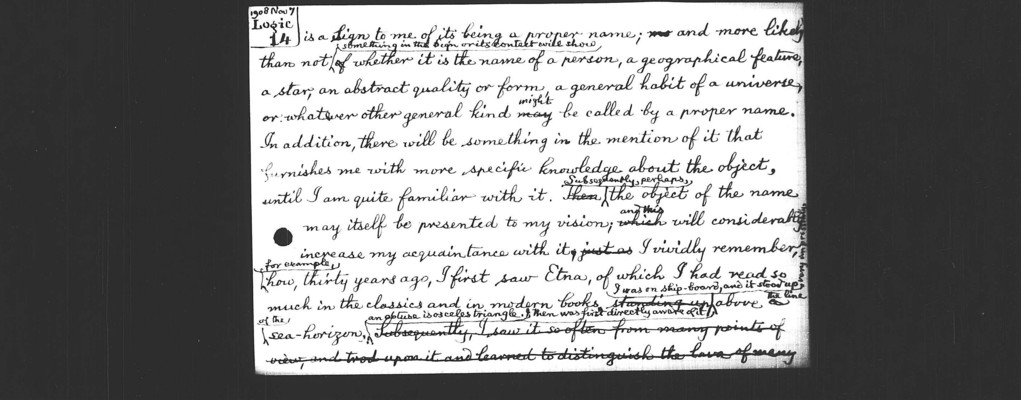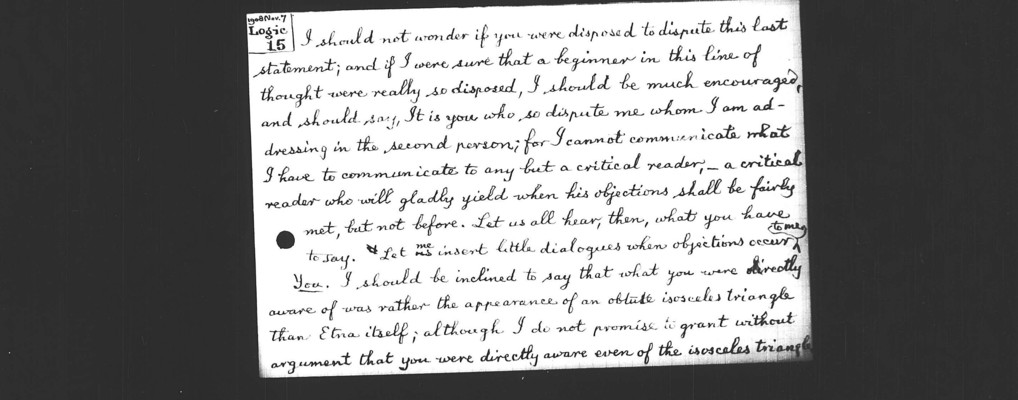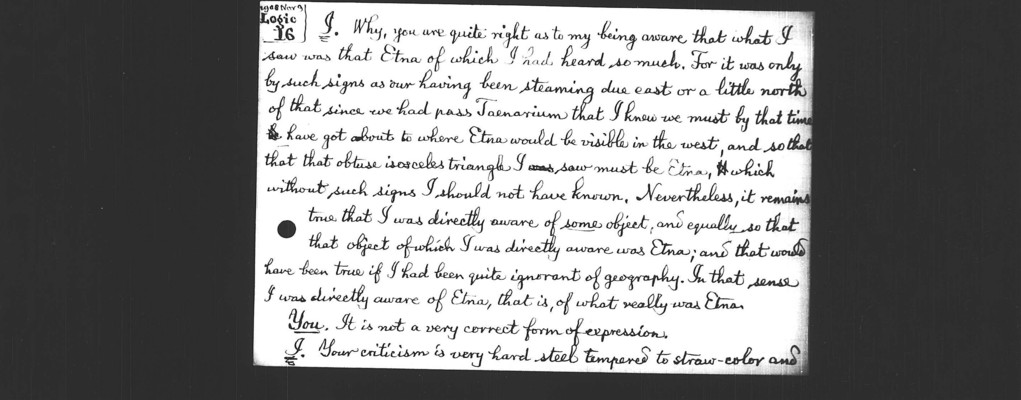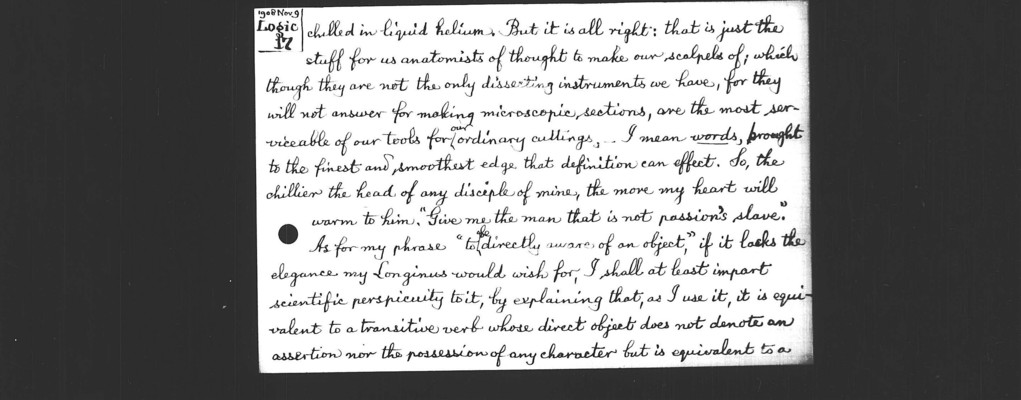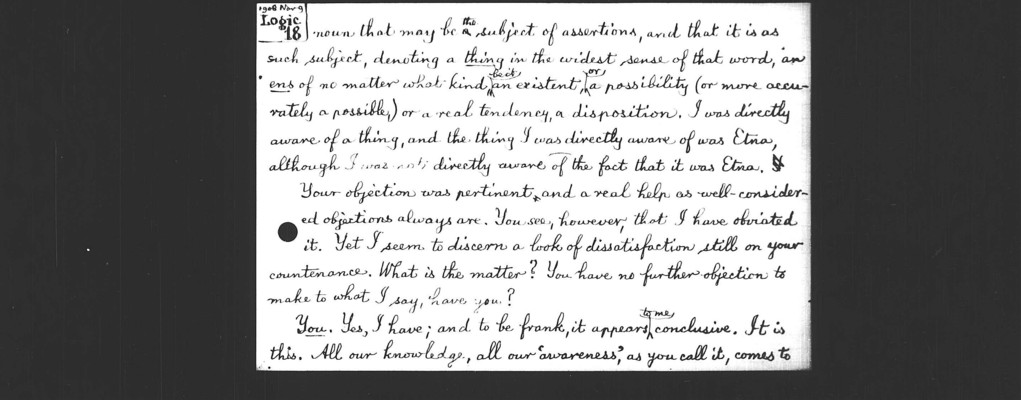Pages
30
1908 Nov 7 Logic 14
is a Sign to me of its being a proper name; and more likely than not something in the sign or its context will show whether it is a name of a person, a geographical feature, a star, an abstract quality or form, a general habit of a universe, or whatever other general kind might be called by a proper name. In addition, there will be something in the mention of it that furnishes me with more specific knowledge about the object, until I am quite familiar with it. Then Subsequently, perhaps, the object of the name may itself be presented to my vision, which and this will considerably increase my acquaintance with it, just as I vividly remember, for example, how, thirty years ago, I first saw Etna, of which I had read so much in the classics and in modern books. I was on ship-board, and it stood up very impressively above the line of the sea-horizon, an obtuse isoceles triangle. I then was first directly aware of it. Subsequently, I saw it so often from many points of view, and trod upon it and learned to distinguish the lava of many
31
1908 Nov 7 Logic 15
I should not wonder if you were disposed to dispute this last statement; and if I were sure that a beginner in this line of thought were really so disposed, I should be much encouraged, and should say, It is you who so dispute me whom I am addressing in the second person; for I cannot communicate what I have to communicate to any but a critical reader,--a critical reader who will gladly yield when his objections shall be fairly met, but not before. Let us all hear, then, what you have to say. Let us me insert little dialogues when objections occur to me
You. I should be inclined to say that what you were directly aware of was rather the appearance of an obtuse isosceles triangle than Etna itself; although I do not promise to grant without argument that you were directly aware even of the isosceles triangle.
32
1908 Nov 9 Logic 16
I. Why, you were quite right as to my being aware that what I saw was that Etna of which I had heard so much. For it was only by such signs as our having been steaming due east or a little north of that since we had pass Taenarium that I know we must by that time have got about to where Etna would be visible in the west, and so that that that obtuse isosceles triangle I saw must be Etna, which without such signs I should not have known. Nevertheless, it remains true that I was directly aware of some object, and equally so that that object of which I was directly aware was Etna; and that would have been true if I had been quite ignorant of geography. In that sense I was directly aware of Etna, that is, of what really was Etna.
You. It is not a very correct form of expression.
I. Your criticism is very hard steel tempered to straw-color and
33
1908 Nov 9 Logic 17
chilled in liquid helium. But it is all right: that is just the stuff for us anatomists of thought to make our scalpels of; which though they are not the only dissecting instruments we have, for they will not answer for making microscopic sections, are the most serviceable of our tools for our ordinary cuttings,--I mean words, brought to the finest and smoothest edge that definition can effect. So the chillier the head of any disciple of mine, the more my heart will warm to him. "Give me the man that is not passion's slave." As for my phrase "to be directly aware of an object," if it lacks the elegance my Longinus would wish for, I shall at least impart scientific perspicuity to it, by explaining that, as I use it, it is equivalent to a transitive verb whose direct object does not denote an assertion nor the possession of any character but is equivalent to a
34
1908 Nov 9 Logic 18
noun that may be the subject of assertions, and that it is as such subject, denoting a thing in the widest sense of that word, an ens of not matter what kind, be it an existent, or a possibility (or more accurately a possible,) or a real tendency, a disposition. I was directly aware of a thing, and the thing I was directly aware of was Etna, although I was not directly aware of the fact that it was Etna. Your objection was pertinent and a real help as well-considered objections always are. You see, however, that I have obviated it. Yet I seem to discern a look of dissatisfaction still on your countenance. What is the matter? You have no further objection to make to what I say, have you?
You. Yes, I have; and to be frank, it appears to me conclusive. It is this. All our knowledge, all our 'awareness', as you call it, comes to
